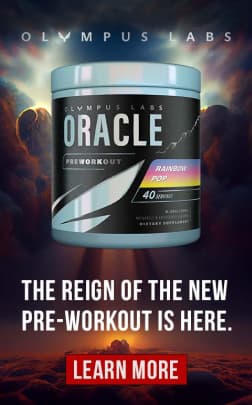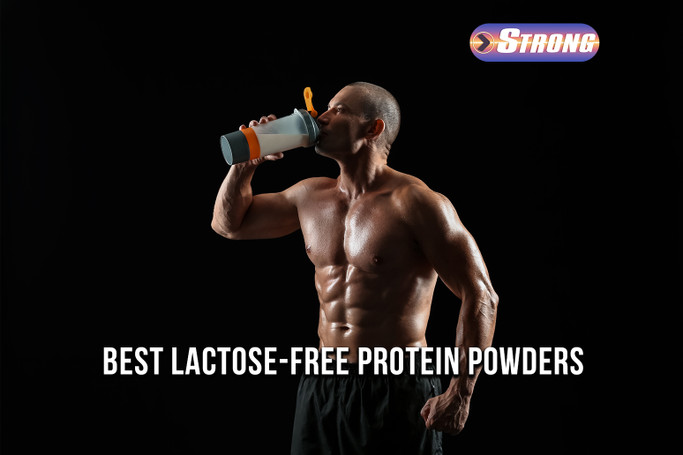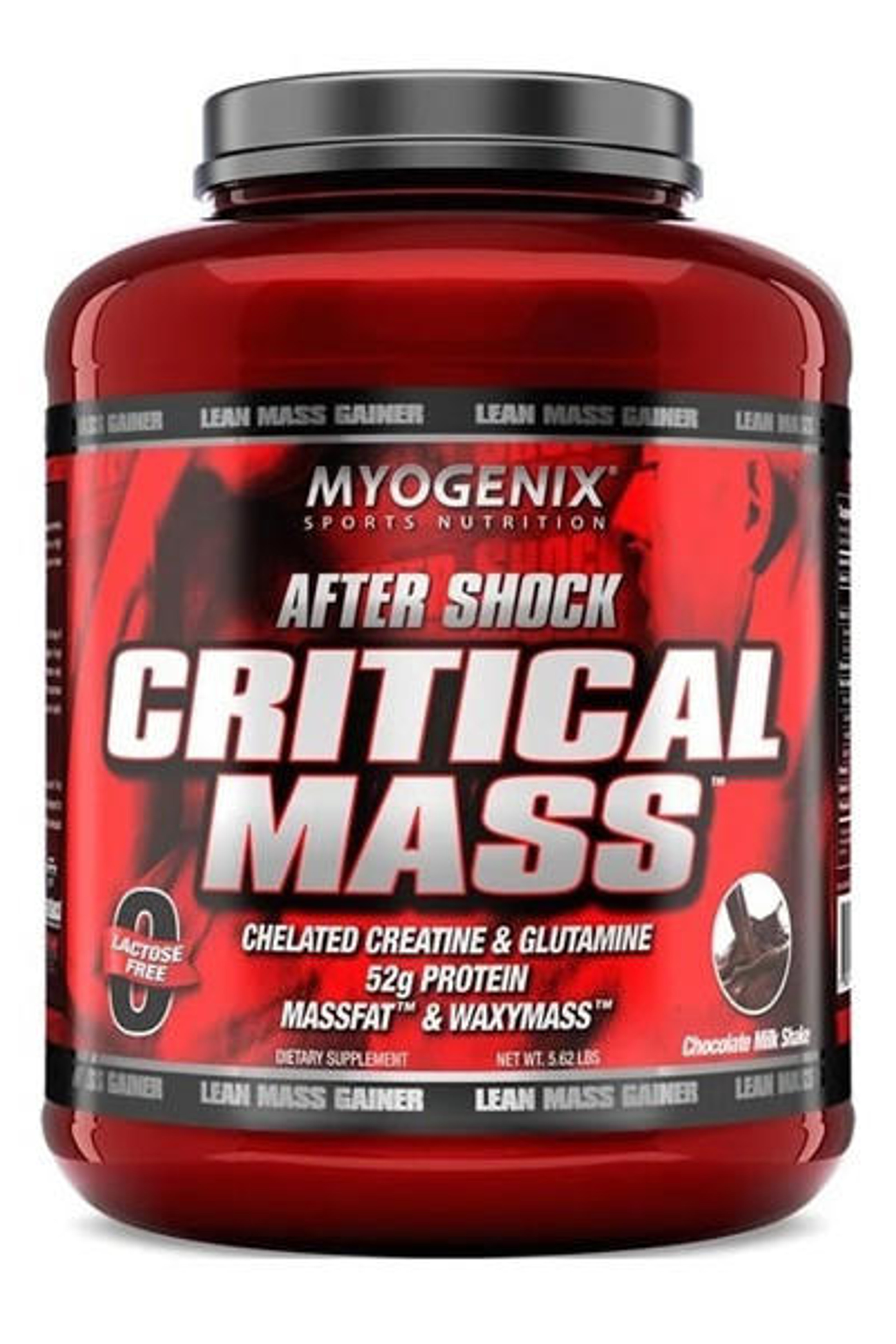The Ultimate Guide to the Best Lactose-Free Protein Powders
Posted by Leonard Shemtob on Jun 08, 2023
Short Summary
- Unleash your fitness journey with the top-rated lactose-free protein powders in our comprehensive guide.
- Score significant gains in weight, muscle, and taste with standout picks such as Aftershock Critical Mass, Aftershock Post Workout, Isomorph 28, and Iso 100.
- Always adhere to the recommended dosage for each product to achieve optimal results and maximize benefits.
- Buy the best lactose-free protein powder suited to your unique needs today and kickstart your path to achieving your fitness goals.
Introduction
Protein powders are essential for various health and fitness goals. Whether it's weight loss, muscle gain, or overall health improvement, these powders have proven to be reliable allies. However, for those with lactose intolerance, the search for the right protein powder can be a bit challenging. So, we're here to help with this comprehensive guide to the best protein powders that are lactose free on the market.
Understanding Lactose Intolerance and Protein Powders
Before we dive into the world of lactose-free protein powders, it's essential to understand what lactose intolerance is. Lactose intolerance is a digestive disorder where the body cannot digest lactose, a type of sugar found in milk and dairy products.
Many protein powders in the market are made from whey protein, a by-product of the cheese-making process, which contains lactose. Consuming whey protein can cause discomfort such as bloating, diarrhea, and stomach cramps for those with lactose intolerance. Luckily, there are many lactose-free alternatives available.
What to Look For in a Lactose-Free Protein Supplement
When choosing a lactose-free protein powder, several factors should be considered.
Protein Content: The primary reason for consuming protein powder is to increase your protein intake. Hence, check the amount of protein per serving.
Protein Source: Protein powders can be made from various sources. Some use plant-based proteins, others use whey protein isolate (a form of whey protein that has almost no lactose), and some use a combination of both.
Artificial Sweeteners: Some protein powders contain artificial sweeteners to enhance their taste. If you're trying to avoid these, look for products labeled as "no artificial sweeteners."
Amino Acid Profile: Proteins are made up of amino acids, and some are more beneficial for muscle building than others. A protein powder with a good balance of essential amino acids is an excellent choice for those looking to gain muscle.
Now, let's explore the top lactose-free protein powders based on various health and fitness goals.
Best Lactose Free Protein Powder For Muscle Gain:
Aftershock Post Workout by Myogenix
When it comes to muscle gain, not just any protein will do. You need a protein powder that's rich in essential amino acids, particularly leucine, isoleucine, and valine, the three branched-chain amino acids (BCAAs) that are vital for muscle growth.
Aftershock Post Workout by Myogenix is our go-to choice. It provides a substantial dose of protein per serving from lactose-free sources, and its amino acid profile is perfectly suited for muscle gain. Its blend of fast-absorbing proteins ensures a quick delivery of amino acids to your muscles right after a workout, thereby maximizing muscle repair and growth.
This lactose-free whey protein powder not only provides optimum nutrition for your muscles but also ensures that you won't have to deal with lactose intolerance symptoms after your workout.
Aftershock Post Workout by Myogenix is specifically designed to aid muscle recovery and promote muscle growth with a high content of protein, carbohydrates, and a specialized blend of amino acids per serving.
Here's is the extensive nutritional breakdown for this product:
- Serving Size: 80 grams
- Servings Per Container: 33
- Calories: 280
- Calories From Fat: 10
- Total Fat: 1.5g (2% DV)
- Saturated Fat: 0.5g (3% DV)
- Cholesterol: 30mg (10% DV)
- Total Carbohydrate: 30g (10% DV)
- Sugar: 15g
- Protein: 34g
- Vitamin A (as vitamin a palmitate): 1000IU (20% DV)
- Vitamin C (as ascorbic acid): 1000mg (1670% DV)
- Vitamin E (as dl-tocopheryl acetate): 60IU (200% DV)
- Thiamin (as thiamine hydrochloride): 3mg (200% DV)
- Riboflavin: 3.4mg (200% DV)
- Niacin (as niacinamide): 40mg (200% DV)
- Vitamin B6 (as pyridoxine hydrochloride): 4mg (200% DV)
- Folate (as folic acid): 800mcg (200% DV)
- Vitamin B12 (as cyanocobalamin): 12mcg (200% DV)
- Pantothenic Acid (as d-calcium pantothenate): 20mg (200% DV)
- Sodium: 159mg (6% DV)
- Potassium: 430mg (12% DV)
- Calcium: 186mg (19% DV)
- AMINO STACK: 8g, a proprietary non-steroidal, highly anabolic formula consisting of muscle volumizers, strength, and recovery agents. This includes MagnaPower Magnesium Creatine Chelate, Magnesium Glycyl Glutamine Chelate, L-Glutamine, L-Norvaline.
- JOINT SUPPORT: 1.5g, this includes Glucosamine Sulfate, Chondroitin Sulfate, MSM.
*Serving sizes, calories, and macro nutrients may vary slightly between the different sizes and flavors*
Best Lactose Free Protein Powder For Weight Gain or Mass Gain
Aftershock Critical Mass by Myogenix
Packing on mass requires a calorie surplus, and one of the best ways to achieve that is through protein supplements. Aftershock Critical Mass by Myogenix is designed with mass gainers in mind.
This lactose-free protein powder offers a high protein content from a combination of whey protein isolate and brown rice. Whey protein isolate is a pure form of whey protein with nearly all the fat and lactose removed, making it a perfect choice for those with lactose intolerance. On the other hand, brown rice protein is a complete plant-based protein that provides all the essential amino acids needed for muscle building.
Aftershock Critical Mass also includes additional carbohydrates to provide the necessary calorie surplus for weight gain. It's a smart choice for those looking to gain weight without the discomfort of lactose.
This product is specifically designed for mass gain with a higher calorie, protein and carbohydrate content per serving:
- Serving Size: 3 Scoops (170g)
- Servings per Container: 15
- Calories: 700
- Calories from Fat: 160
- Total Fat: 18g (28% DV)
- Saturated Fat: 3.5g (18% DV)
- Trans Fat: 0g
- Cholesterol: 105mg (34% DV)
- Total Carbohydrates: 85g (28% DV)
- Dietary Fiber: 9g (38% DV)
- Soluble Fiber: 6g
- Insoluble Fiber: 3g
- Sugars: 15g
- Protein: 52g
- Calcium: 341mg (34% DV)
- Phosphorus: 303mg (34% DV)
- Magnesium: 261mg (65%)
- Sodium: 350mg (15% DV)
- Potassium: 1010mg (29% DV)
*Serving sizes, calories, and macro nutrients may vary slightly between the different sizes and flavors*
Best Tasting Lactose Free Protein Powder
Isomorph 28 by APS Nutrition
Taste is a crucial factor when choosing a protein powder. After all, you're more likely to stick with a product that you enjoy consuming. If you're tired of compromising on taste while avoiding lactose, Isomorph 28 by APS Nutrition is for you.
Isomorph 28 by APS Nutrition uses a blend of plant-based proteins, including pea protein powder and chia seeds, alongside its whey protein isolate. The pea protein offers a pleasant taste and texture, while the chia seeds add a bit of crunch and a boost of fiber and omega-3 fatty acids. The result is a protein shake that's not just lactose-free but also delicious.
Isomorph offers a balance of protein and carbohydrates with limited fats. Each serving contains:
- Serving Size: 1 Scoop
- Servings per Container: 27
- Calories: 130
- Calories from Fat: 5
- Total Fat: 1g (1% DV)
- Saturated Fat: 0g
- Cholesterol: 5mg (2% DV)
- Sodium: 80mg (3% DV)
- Potassium: 200mg (6% DV)
- Total Carbohydrate: 4g (1% DV)
- Sugars: 2g
- Protein: 28g (56% DV)
- Calcium: 100mg (10% DV)
*Serving sizes, calories, and macro nutrients may vary slightly between the different sizes and flavors*
Best Lactose-Free Protein Powder For Weight Loss:
Iso 100 by Dymatize Nutrition
If your goal is to lose weight, your protein powder should be low in calories but high in protein. You also want to avoid unnecessary additives and sweeteners that can disrupt your weight loss efforts.
Iso 100 by Dymatize Nutrition fits these criteria perfectly. This lactose-free protein powder offers a high protein content per serving, ensuring that you're satiated and less likely to overeat. It's also free of artificial sweeteners and low in carbohydrates, making it a great addition to any weight loss diet.
Iso 100 is derived from whey protein isolate, ensuring that it's almost entirely free of lactose. If you're looking for a protein supplement to support your weight loss goals without causing digestive discomfort, Iso 100 is a solid choice.
Iso 100 by Dymatize Nutrition offers a high protein, low calorie and virtually zero fat and carbohydrate formulation:
- Serving Size: 1 Scoop
- Servings per Container: 24+
- Calories: 110
- Calories From Fat: 5
- Total Fat: 0g
- Saturated Fat: 0g
- Trans Fat: 0g
- Cholesterol: 5mg
- Sodium: 150mg
- Potassium: 160mg
- Total Carbohydrate: 1g
- Dietary Fiber: 0g
- Sugars: 0g
- Protein: 25g
- Calcium: 15% DV
*Serving sizes, calories, and macro nutrients may vary slightly between the different sizes and flavors*
Conclusion
Lactose-free protein powders have become increasingly popular in recent years due to the rise in lactose intolerance and dietary preferences. They offer a fantastic way to increase protein intake without the discomfort that lactose can cause some individuals.
Whether you're trying to gain muscle, lose weight, or simply improve your overall health, there's a lactose-free protein powder out there that can help you achieve your goals.
From the muscle-building Aftershock Post Workout by Myogenix to the delicious Isomorph 28 by APS Nutrition, these powders are all excellent choices. However, remember that a protein supplement is just that - a supplement to a balanced diet and regular exercise.
A study published in the Journal of the International Society of Sports Nutrition found that consuming protein supplements can lead to significant improvements in body composition and exercise performance when combined with a structured training program. So, make sure you're also putting in the effort in your workouts and maintaining a balanced diet.
As the Mayo Clinic advises, it's also essential to check with your doctor or a dietitian before adding a protein supplement to your diet. They can help you determine how much protein you need and whether a supplement is the right choice for you.
In the end, finding the right lactose-free protein powder for you may take some trial and error. But with this guide, you're well-equipped to make an informed choice.
Written and Sponsored by Leonard Shemtob
Leonard Shemtob is President of Strong Supplements and a published author. Leonard has been in the supplement space for over 20 years, specializing in fitness supplements and nutrition. Leonard appears on many podcasts, written over 100 articles about supplements and has studied nutrition, supplementation and bodybuilding.
Leonard's articles have been published in many top publications around the web. Leonard enjoys weight training, playing basketball and yoga, and also enjoys hiking. In his free time he studies and works on improving himself. For more detailed information, visit his official blog.
Lactose-Free Protein Powder FAQs
Whey or Milk protein is not the only options when it comes to getting in your daily protein intake. Lactose intolerant individuals have a variety of alternative protein sources available, such as:
Plant-Based Protein Powder: These include pea, hemp, and brown rice proteins. Some blends combine multiple plant-based proteins for a complete amino acid profile.
Egg Protein: A complete protein source, egg protein is rich in essential amino acids and is available in powder form.
Soy Protein: One of the few plant proteins that provide all essential amino acids, soy protein is a great lactose-free option.
Beef Protein Isolate: A lactose-free and carb-free protein source derived from beef, offering a complete amino acid profile.
Rice Protein: This hypoallergenic protein is often mixed with pea protein to provide a full amino acid profile.
Hemp Protein: Easily digestible, hemp protein is rich in omega-3 fatty acids and provides a complete amino acid profile.
Always consult with a healthcare provider or a nutritionist to find the protein source that best meets your dietary needs and goals.
Related Articles
Read More About Protein

- Pasiakos, Stefan M., et al. "The effects of protein supplements on muscle mass, strength, and aerobic and anaerobic power in healthy adults: a systematic review." Journal of the International Society of Sports Nutrition 12.1 (2015): 39.
- Mayo Clinic Staff. "Do protein shakes really work?" Mayo Clinic, 2022.
- Hoffman, Jay R., and Michael J. Falvo. "Protein – Which is Best?" Journal of Sports Science and Medicine 3.3 (2004): 118–130.
- Kerksick, Chad M., et al. "International Society of Sports Nutrition Position Stand: Protein and Exercise." Journal of the International Society of Sports Nutrition 14 (2017): 20.
- Messina, Mark, and Reed Mangels. "Considerations in Planning Vegan Diets: Children." Journal of the American Dietetic Association 101.6 (2001): 661–669.
- Tipton, Kevin D., et al. "Postexercise Net Protein Synthesis in Human Muscle from Orally Administered Amino Acids." American Journal of Physiology-Endocrinology and Metabolism 276.4 (1999): E628–E634.
- Newsholme, E. A., and A. R. Leech. "Biochemistry for the Medical Sciences." Wiley (1983).





